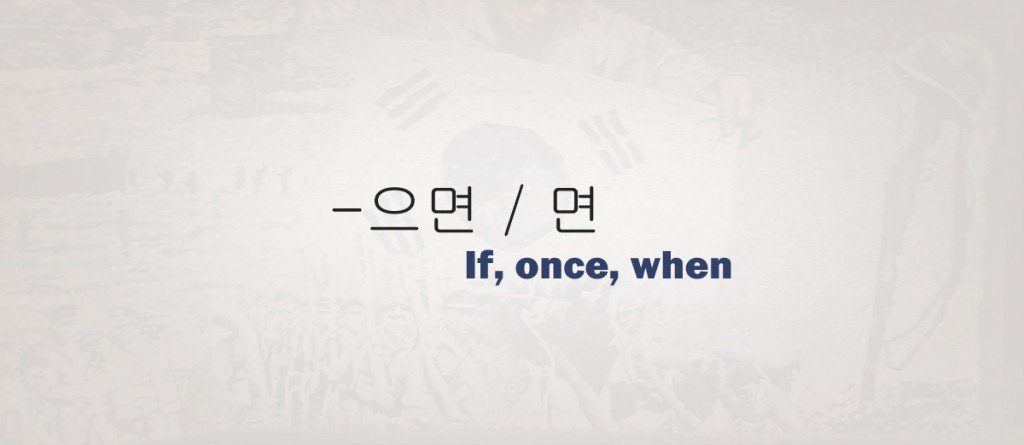if/once/when in Korean – 으면 / 면 Grammar Lesson
으면 / 면 Grammar Explanation
Being able to say “if” in any language you want to speak is essential. In Korean, there are a few variations but the -으면 / 면 grammar pattern is the most important one. It works on both DVST (descriptive verbs) and AVST (action verbs) so if you want to say “if I do” or “if you are pretty,” it can all be done with -으면/ 면. To use it attach-면 to verb stems ending with a vowel and -으면 to verb stems ending with a consonant.
For example:
- 예쁘다 -> 예쁘면 if you are pretty…
- 가다 -> 가면 if you go…
- 하다 -> 하면 if I do …
- 받다 -> 받으면 if you receive…
- 죽으면 -> if I die…
Here are some problems for you to solve. How do you conjugate the following verbs with the -으면 / 면 grammar pattern?
If you want to spice things up and stress the meaning of “if” even further, you can use adverbs like 혹시, 만약 and 만일 .
으면 / 면 to express “when” or “once”
Aside from just meaning “if,” The -으면 / -면 grammar pattern can also be used to mean “once” or “when.” For example, “도착하면 연락해” would translate to”contact me once you arrive” and not “contact me if you arrive.” Some Koreans think that the same applies to English, so you will sometimes hear Koreans say “if you arrive…” when it’s is already clear that you will arrive.
Please Note
- You can NOT talk about things that happened in the past (in the second clause).
- 도착하면 연락했어요 (X)
- 도착하면 연락하세요. (O)
= Contact me once you arrive
- If the subject in the first clause (before -면) is different from the subject in the second clause (after -면), both subjects should be marked with 이/가 and not 은/는.
- 지현씨는 돈이 없으면 재가 계산하겠습니다. (X)
- 지현씨가 돈이 없으면 제가 계산하겠습니다. (O)
= I’ll pay the bill if Ji-Hyeon doesn’t have any money.
- To say “when” in Korean, the -으면 / -면 grammar pattern can only be used in certain circumstances (i.e. if a condition is met). ㄹ 때 is used in most cases to express a time when something happens/happened.
- 여기는 어렸으면 자주 가던 공원이다. (X)
- 여기는 어렸을때 자주 가던 공원이다. (O)
= This is a park I used visit a lot when I was young.
- 도착하다 – to arrive
- 공원 – park
- 어리다 – to be young
- 계산하다 – to pay
- 연락하다 – to contact
Did you find this lesson useful? Please like or share! Or why not leave a comment if you have any questions?
By Kimchi Cloud





